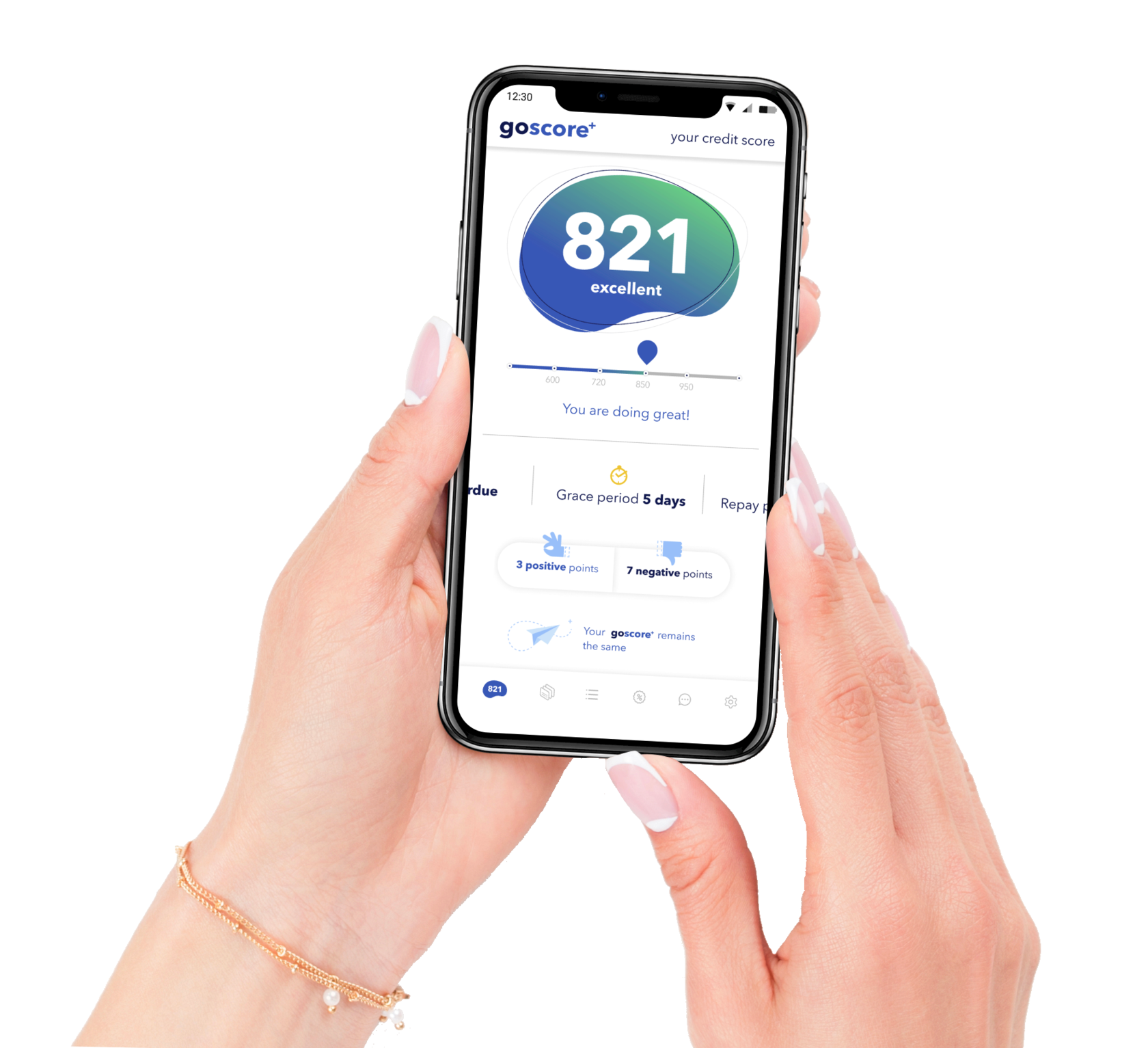Stay tuned for the latest FinTech news with goblog
Subscribe to goblog and get useful articles about
FinTech innovations and managing your finances.
FinTech innovations and managing your finances.
Your data is always safe with us. By clicking the button you agree our
Join the waitlist
Be the first to get all benefits of a new fair credit score
Your data is always safe with us. By clicking the button you agree our
Meld på ventelisten
Vær den første som får alle fordelene ved en ny rettferdig kreditt score
Your data is always safe with us. By clicking the button you agree our
What does a credit score mean?


6 min read
31.07.2019
Academy

by Max
This practical article in simple words explains:
- what a credit score means;
- where you can check your credit score;
- how to understand the credit score scale;
- what a high or low credit score means;
- how and who calculates your credit score.
- what a credit score means;
- where you can check your credit score;
- how to understand the credit score scale;
- what a high or low credit score means;
- how and who calculates your credit score.
What does a credit score mean?
A credit score is a number that shows your ability to repay loans. It reflects the banks trust level of you.
Every time you want to get a loan or lease a car, banks and other companies request your credit report with information about your credit and payment history. Your final credit score is based on this credit report.
Every time you want to get a loan or lease a car, banks and other companies request your credit report with information about your credit and payment history. Your final credit score is based on this credit report.
Your credit score affects your chances of getting:
consumer loans, mortgages or credit cards;
household appliances and mobile phones contracts;
rent a house or other property;
car loans or leasing a car;
insurance contracts and payments;
utility bills monthly payments.
Good clothes open all doors,
good credit score open all loans.
good credit score open all loans.
Which companies can calculate your credit score?
As of today, there are four companies (credit reference agencies) in Norway that can calculate your credit score: Creditsafe, EVRY, Experian and Bisnode.
Goscore is now working on developing its own system of credit scoring, and once we become a licensed Credit Reference Agency (CRA) we will be among these companies.
Every credit reference agency uses information about you from publicly available sources and your credit history for preparing credit report and calculating your credit score.
After receiving your credit report, the banks and other companies decide whether or not to give you a loan and on what terms.
Each company has its own internal criteria for giving loans. This means that one bank may refuse to give you a loan, while a second may decide to give you one, probably with a high interest rate.
Goscore is now working on developing its own system of credit scoring, and once we become a licensed Credit Reference Agency (CRA) we will be among these companies.
Every credit reference agency uses information about you from publicly available sources and your credit history for preparing credit report and calculating your credit score.
After receiving your credit report, the banks and other companies decide whether or not to give you a loan and on what terms.
Each company has its own internal criteria for giving loans. This means that one bank may refuse to give you a loan, while a second may decide to give you one, probably with a high interest rate.
You can read more about credit report in our article "What will you find in your credit report".
Scale of a credit score
Credit score from Goscore is a number from 0 to 999 points.
The closer your credit score is to 999, the higher the likelihood of obtaining a profitable loan. And the lower your credit score, the more careful banks will be in deciding to give you a loan.
The closer your credit score is to 999, the higher the likelihood of obtaining a profitable loan. And the lower your credit score, the more careful banks will be in deciding to give you a loan.
- You are the first type of clients who gets credit offer with the lowest level of interest rates.
- You have a great history of payments without delay and low balance on credit cards.
- You can apply for the most favorable conditions and the lowest interest rates on mortgages, consumer loans, credit cards
- You are a financially responsible person and manage credits wisely.
- Your credit history shows that payments on loans, leasing, mortgages or rental housing are made on time. You try to keep the credit card balances below average.
- You can get good credit offers with low interest rates, but it may be harder to get credit with the lowest interest rates.
Excellent
Good
Fair
Poor
- It's very possible for a loan to be rejected or getting a credit with the highest interest rates.
- Your credit history has many serious offenses with regular payment delays or negative credit experience with several banks or credit lines.
- Your chance to get a loan or a credit card is very low. You need to change your financial behavior.
- You are "middle" type of clients and can get credit with standard interest rates.
- Your credit history has some flaws. But you don't have any serious offenses or regular delays in payments.
- You can get standard credit offers, but it can be with high interest rates or with low credit limits.
- You are the first type of clients who gets credit offer with the lowest level of interest rates.
- You have great history of payments without delay and low balance on credit cards.
- You can apply for the most favorable conditions and the lowest interest rates on mortgages, consumer loans, credit cards
- You are a financially responsible person and manage credits wisely.
- Your credit history shows that payments on loans, leasing, mortgages or rental housing are made on time. You try to keep the credit card balances below average.
- You can get good credit offers with low interest rates, but it may be harder to get credit with the lowest interest rates.
- You are "middle" type of clients and can get credit with standard interest rates.
- Your credit history has some flaws. But you don't have any serious offenses or regular delays in payments.
- You can get standard credit offers, but it can be with high interest rates or with low credit limits.
Excellent
Good
Fair
Poor
- It's very possible for a loan to be rejected or getting a credit with the highest interest rates.
- Your credit history has many serious offenses with regular payment delays or negative credit experience with several banks or credit lines.
- Your chance to get a loan or a credit card is very low. You need to change your financial behavior.
What does a high or low credit score mean?
A high credit score shows the banks that you are a responsible person financially who pays off your loans on time and who can be trusted with money.
For example, you can reach a high credit score, if:
A low credit score indicates to the bank that it can put itself at great risk if it gives you a loan or a credit card.
For example, you can have a low credit score, if:
For example, you can reach a high credit score, if:
- you keep balances on your credit cards low;
- you bought a mobile phone or household appliances on credit and every month pay on time;
- you always pay bills without delay and never receive letters from collection agencies.
A low credit score indicates to the bank that it can put itself at great risk if it gives you a loan or a credit card.
For example, you can have a low credit score, if:
- you have repeatedly delayed loan payments;
- you have high credit card balances;
- you have been caught providing false information about your financial situation;
- debt collection proceedings have been opened against you.
That's why we always advise to first check your credit report and credit score, improve it (if it's low) and then apply for a loan.
How is your credit score calculated?
When preparing a credit report, credit reference agencies can use 2 categories of information:
- information from publicly available sources;
- information about your credit history.
The first category includes information about:
- owning a car, house or other personal property;
- the processes opened by collection agencies against you;
- statement that a person is placed under guardianship;
- bankruptcy;
- taxes.
The second category includes information about:
- any open credit lines (credits, mortgages, credit cards);
- absence/presence of late payments on bills and loans;
- duration of your credit history;
- usage of credit card balance;
- closed or refinanced credit lines (credits, mortgages, credit cards).
Each factor can have a different degree of influence on your final credit score. So, for example, if you have a long good credit history and delay one payment, you will not be as significantly lowered in your credit score, as you would if you regularly received letters from collection agencies about late payments.
Find out more about credit history in our 8 tips: what to do if you have no a credit history.
How we explain "credit score" to children

Imagine that you need to solve 2 difficult math tasks in a test. And for each task you solve, you will receive 1-6 points.
Based on the test results, the teacher will give each pupil one candy for each point they score on the test.
For example, you solved one task for 6 points, and the second - for 5 points. And your friend got 4 points for each task.
Based on the test results, the teacher will give each pupil one candy for each point they score on the test.
For example, you solved one task for 6 points, and the second - for 5 points. And your friend got 4 points for each task.
Your final number of points is your "credit score".
You have 11 points and get 11 candies. And your friend has 8 points and gets only 8 candies.
So you see: the more points you have, the more candies you get. The same is with adults: the higher their credit score is, the more bonuses they can get.
You have 11 points and get 11 candies. And your friend has 8 points and gets only 8 candies.
So you see: the more points you have, the more candies you get. The same is with adults: the higher their credit score is, the more bonuses they can get.
Your final number of points is your "credit score".
You have 11 points and get 11 candies. And your friend has 8 points and gets only 8 candies.
So you see: the more points you have, the more candies you get. The same is with adults: the higher their credit score is, the more bonuses they can get.
You have 11 points and get 11 candies. And your friend has 8 points and gets only 8 candies.
So you see: the more points you have, the more candies you get. The same is with adults: the higher their credit score is, the more bonuses they can get.
Imagine that you need to solve 2 difficult math tasks in a test. And for each task you solve, you will receive 1-6 points.
Based on the test results, the teacher will give each pupil one candy for each point they score on the test.
For example, you solved one task for 6 points, and the second - for 5 points. And your friend got 4 points for each task.
Based on the test results, the teacher will give each pupil one candy for each point they score on the test.
For example, you solved one task for 6 points, and the second - for 5 points. And your friend got 4 points for each task.


Imagine that you need to solve 2 difficult math tasks in a test. And for each task you solve, you will receive 1-6 points.
Based on the test results, the teacher will give each pupil one candy for each point they score on the test.
For example, you solved one task for 6 points, and the second - for 5 points. And your friend got 4 points for each task.
Based on the test results, the teacher will give each pupil one candy for each point they score on the test.
For example, you solved one task for 6 points, and the second - for 5 points. And your friend got 4 points for each task.
Your final number of points is your "credit score".
You have 11 points and get 11 candies. And your friend has 8 points and gets only 8 candies.
So you see: the more points you have, the more candies you get. The same is with adults: the higher their credit score is, the more bonuses they can get.
You have 11 points and get 11 candies. And your friend has 8 points and gets only 8 candies.
So you see: the more points you have, the more candies you get. The same is with adults: the higher their credit score is, the more bonuses they can get.
Official sources
We have prepared a list of official sources from which you can learn more about credit scoring.
Datatilsynet - read about credit scoring.
Datatilsynet - current credit score regulations.
Datatilsynet - read about credit scoring.
Datatilsynet - current credit score regulations.
Summary
A credit score is a number from 0 to 999 points that reflects your ability to repay loans.
1
A credit score affects your chances of getting all types of loans (car loan, mortgages, credit cards and others), insurance or mobile phone contracts.
2
A credit score calculation is based on public information about you and your credit and payment history.
3
The closer your credit score to 999, the higher the likelihood of obtaining a profitable loan. And the lower your credit score, the more careful banks will be in deciding to give you a loan.
4




CEO @ Goscore
Maksim Hardziyenak
Education
Max has a bachelors degree in programming and mathematical methods and models. That's why he is not only an excellent developer but also an experienced Data Science and Machine Learning specialist.
Max holds an MSc degree in logistics and is currently working to obtain an MBA degree.
Job and experience
Max developed and taught his own IT course at the BSU (Belarus).
He has previously worked as a Senior Developer, Product Manager, CTO, and independent IT consultant.
Now Max applies all his accumulated experiences in the creation and development of Goscore.
What colleagues appreciate in Max
Colleagues appreciate Max's support, advice, and ability to analyze the situation from all sides and offer the best solution.
Hobby
His secret hobby is assembling realistic car models.
Max has a bachelors degree in programming and mathematical methods and models. That's why he is not only an excellent developer but also an experienced Data Science and Machine Learning specialist.
Max holds an MSc degree in logistics and is currently working to obtain an MBA degree.
Job and experience
Max developed and taught his own IT course at the BSU (Belarus).
He has previously worked as a Senior Developer, Product Manager, CTO, and independent IT consultant.
Now Max applies all his accumulated experiences in the creation and development of Goscore.
What colleagues appreciate in Max
Colleagues appreciate Max's support, advice, and ability to analyze the situation from all sides and offer the best solution.
Hobby
His secret hobby is assembling realistic car models.
Stay tuned for the latest fintech news with goblog
Subscribe to goblog and get useful articles about
fintech innovations and managing your finances.
fintech innovations and managing your finances.
Read more useful articles

6 min read
Academy

5 min read
Tips&Tricks

6 min read
Tips&Tricks

